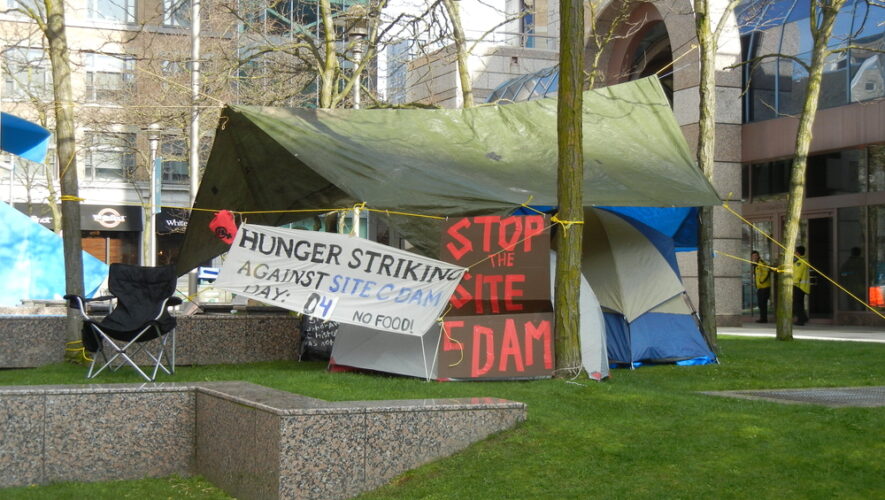Ruling dramatically lowers the bar for First Nations to demonstrate their treaty rights have been infringed
By Julius Melnitzer | July 28, 2021
A British Columbia Supreme Court decision requiring the provincial government to consider the “cumulative effects” of development could mandate First Nations’ consent for any new project on historic treaty lands in Canada.
Justice Emily Burke’s 511-page decision in Yahey v. B.C., released on June 29, forbids B.C. from authorizing further development in BRFN territory unless an agreement for a satisfactory regulatory approval regime can be reached within six months.
“The upshot is that B.C.’s legal authority to authorize new developments, like roads and wind farms, must take into account cumulative effects management that ensure that the combined impact of new developments don’t produce an infringement on treaty rights,” said Sander Duncanson in Osler, Hoskin & Harcourt LLP’s Calgary office. “It’s hard to imagine, however, what that would look like without full consent from Blueberry and all the other First Nations whose treaty rights overlap.”
Although BFRN is a small First Nation of 190 members living on its reserves just northwest of Fort St. John, B.C., and 295 off-reserve, its traditional territory comprises an expanse of 38,000 square kilometres, including most of the Montney Formation, one of the country’s most active natural gas development targets, municipalities such as Fort St. John and Dawson Creek, forestry operations, two hydroelectric dams, and the controversial under-construction Site C dam on the Peace River.
Evidence at the trial demonstrated that some 84 per cent of Blueberry territory is within 500 metres, and 73 per cent within 250 metres, of an industrial disturbance. In 2016, the David Suzuki Foundation and Ecotrust Canada concluded that more than 110,000 kilometres of pipelines, roads, transmission lines and seismic lines populated Blueberry territory.
But Yahey’s impact could extend well beyond BRFN territory.
“It could also materially increase regulatory risks wherever similar historic treaties are in place, including most of northern Ontario, right across the Prairies and the Northwest Territories,” Duncanson said. “We expect that Yahey will lead to similar claims that could change the future of resource and infrastructure development in Canada.”
The issue facing the court was whether BRFN’s rights under Treaty 8, signed in 1900, had been infringed by the cumulative impacts of industrial development, including forestry, oil and gas, renewable energy and agriculture, during the past 120 years. Justice Burke concluded that the province had breached the agreement because it allowed development without the community’s approval, thereby violating its promise to maintain BRFN’s treaty rights to hunt, fish and trap within its traditional territory.
Burke’s ruling dramatically lowers the bar for First Nations to demonstrate that their treaty rights have been infringed. Previous cases from the Supreme Court of Canada (SCC) state that infringement occurs when there is “no meaningful exercise of the rights.” But the test Burke articulated is whether there has been a “significant or meaningful diminishment” of rights.
The circumstances of the BRFN decision, however, differ from earlier treaty rights jurisprudence, where allegations of infringement focused on a single piece of legislation, regulatory regime or project. Burke’s judgment noted that while no individual project had a devastating effect on the community, the cumulative effect produced a limitation of treaty rights. For this reason, among others, appeal courts that deal with the issue may find that her decision did not intrude on SCC pronouncements.
Still, Duncanson believes an appeal could well succeed.
“Because the decision creates new law and really has significant implications for the entire country, the likelihood of a reversal on appeal is reasonably high,” he said.
But whether or not B.C., whose automatic right of appeal expires on July 29, will choose to do so is unclear. Already, BRFN Chief Marvin Yahey and other Treaty 8 nations are urging B.C. not to appeal the judgment.
Yahey told the media that a government committed to reconciliation would not appeal. For his part, Chief Trevor Makadahay of the Doig River First Nation, told the media the case represented the “preservation of the connection to our land.”
B.C.’s Ministry of the Attorney General would not comment on whether the government would appeal. But the Ministry of Indigenous Relations and Reconciliation issued a statement confirming that it will contact First Nations to discuss the issues. Yahey is on record that his people are not anti-development, but want the government to consult them.
However this may be, there’s no question that the case is making waves among project developers.
“Most companies are quite concerned about how the decision impacts other parts of the country, even where the treaties are slightly different or where there are no treaties,” Duncanson said.
RELATED ARTICLES
Bare Bones Briefs: Duty to consult is double-edged sword
Is Trudeau’s support for UNDRIP a meaningless ploy?
Government should be honest about its support for UN Indigenous rights resolution
Why B.C.’s Indigenous rights bill is ‘impractically broad’ and inconsistent with Canadian law
